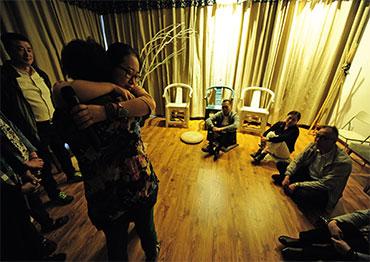Xiao Li had been interested in a psychology-related career for a long time, although she did not study it at university. After the national psychological counselor qualification examination was launched in 2002, she passed the exam and obtained a level-three (highest is level two, lowest is level four) counseling certificate in 2007.
The rapid development of the mobile internet and social media fostered the growth of counseling in China. Huang Weiqiang, who studied psychology, founded Yi Psychological Counseling, an online platform. According to Huang, the platform has around 25 million users, with nearly 100,000 people having participated in training courses. Total revenue from a popular online course can reach 4 million yuan (US$610,000).
In 2015, as social media platforms such as WeChat took off, Xiao saw that the counseling industry was becoming more popular. As online training courses multiplied, she predicted a boom.
Even so, when she decided to become a counselor, she found gaps in her knowledge. In her three years on the platform, she took at least 10 courses, each costing from 1,000 to 2,000 yuan (US$152-305). She attended offline courses and workshops, like those offered by psychology Professor Zhu Jianjun of Beijing Forestry University, which run to 5,000 yuan (US$762) a year.
Still she found her knowledge was lacking. She knew a lot of theory but not how to perform proper consultations. In 2017, she spent another 30,000 yuan (US$4,572) on a two-year program from Jiandan Psychology. Xiao told the reporter the program is comprehensive, and after completing it many of her classmates practiced methods from different schools of psychotherapy.
But Xiao still felt it was not enough. She explained that the psychoanalytic school initially founded by Sigmund Freud has since developed into many sub-branches, so if she wants to specialize, it would take two more years to sharpen her skills. In the past three years, she has spent at least 80,000 yuan (US$12,192) on counseling training.
Generally in China, there are two main motivations to pursue psychological counseling: interest or to resolve personal issues. Many people become “trapped” in the learning process, taking more and more courses in their desire to become a psychological counselor.
According to a survey conducted among more than 1,200 counselors across the country, women account for nearly 79 percent of trainees, and nearly 76 percent are in their 30s or 40s, mostly living in economically developed cities such as Beijing, Shanghai, Guangzhou and Shenzhen.
Like Xiao Li, many have invested huge amounts of time and money in training programs. Liu Qian, a would-be counselor who studies with Yi Psychological Counseling, has spent around 80,000 yuan (US$12,192).
According to self-reported data from the Jiandan Psychology platform, more than 50 percent of beginners have backgrounds in finance, internet or education, and nearly 50 percent have graduate degrees. Liu told the reporter that a classmate had spent over 200,000 yuan (US$30,480).
The longer they study, the more psychotherapists spend on the study programs, which are forever offering upgrades and options. According to data from Yi Psychological Counseling, with a consultation experience of less than 100 hours, the average cost of training is around 46,000 yuan (US$7,010). With consultation experience ranging from 100 to 500 hours, the average cost is 84,000 yuan (US$12,802). With consultation experience of over 5,000 hours, the cost could soar to 240,000 yuan (US$36,576).
Li Songwei, a well-known psychotherapist in China with a doctorate in psychology from Peking University, told NewsChina that he has seen many therapists study for a decade or more before they start practicing.

 Old Version
Old Version

